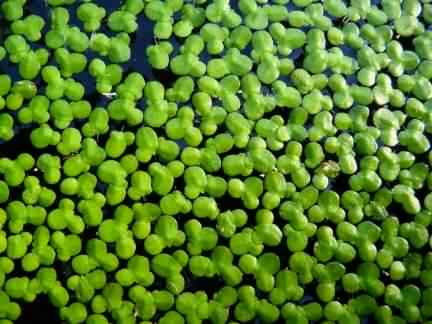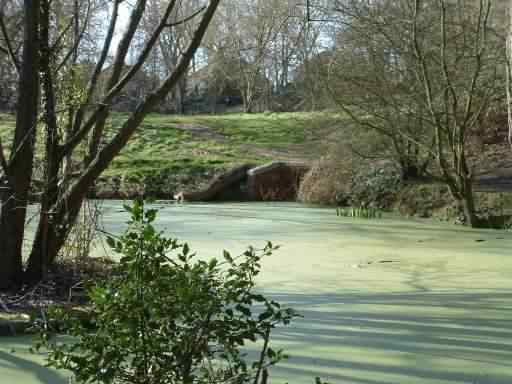
Photo ©2005 Barbarossa
Click any photo for a larger image

Photo ©2007–
Duckweed on Brickfields pond in 2007

Photo ©2005 Barbarossa
Click any photo for a larger image

Photo ©2007–
Duckweed on Brickfields pond in 2007
Common Duckweed - Lemma minor
Family - Araceae
Duckweed is a tiny rapidly growing floating aquatic perennial plant sometimes used as a model system for plant biology and as an animal feed. Lemna species grow by vegetative reproduction where new plants bud off from the adult plant as simple free–floating thallus on or just beneath the water surface thus allowing rapid colonisation of a water body forming dense mats of vegetation blocking out sunlight to the lower levels of a water column. This can be useful in preventing algae growth, and the plant is also useful in removing excess nitrogen and in bio–remediation of polluted waters but eventually the dense mats of vegetation are considered a nuisance that takes a lot of work to eradicate which will kill off the aquatic life from lack of Oxygen and sunlight.
Control of Duckweed can be done mechanically but it will always grow back from the one missed plant, or by the addition of herbivorous fish E.g. Grass Carp or by treatment with a herbicide. A hard winter frost where the top several centimeters (three inches) of the water surface is frozen solid for around a week or more will kill duckweed. Dried Duckweed as "Duckweed Meal" makes a good high protein cattle feed, low in fat with about 10% fibre.
Duckweed is widespread throughout temperate regions of the world, including North America, Eurasia, Australia, and New Zealand, preferring freshwater ponds, marshes, lakes, and quiet streams, spreading rapidly across quiet bodies of water that are rich in nutrients, growing best in water with high levels of nitrogen and phosphate. Moving or agitated water will limit the growth of Duckweed. It is occasionally used in larger fish tanks to control nitrogen levels.
Site design ©1999– Brickfields Country Park - Privacy -